One in a million
This article was produced as a project for the Dennis A. Hunt Fund for Health Journalism, a program of the USC Annenberg Center for Health Journalism.
Other stories in the series include:
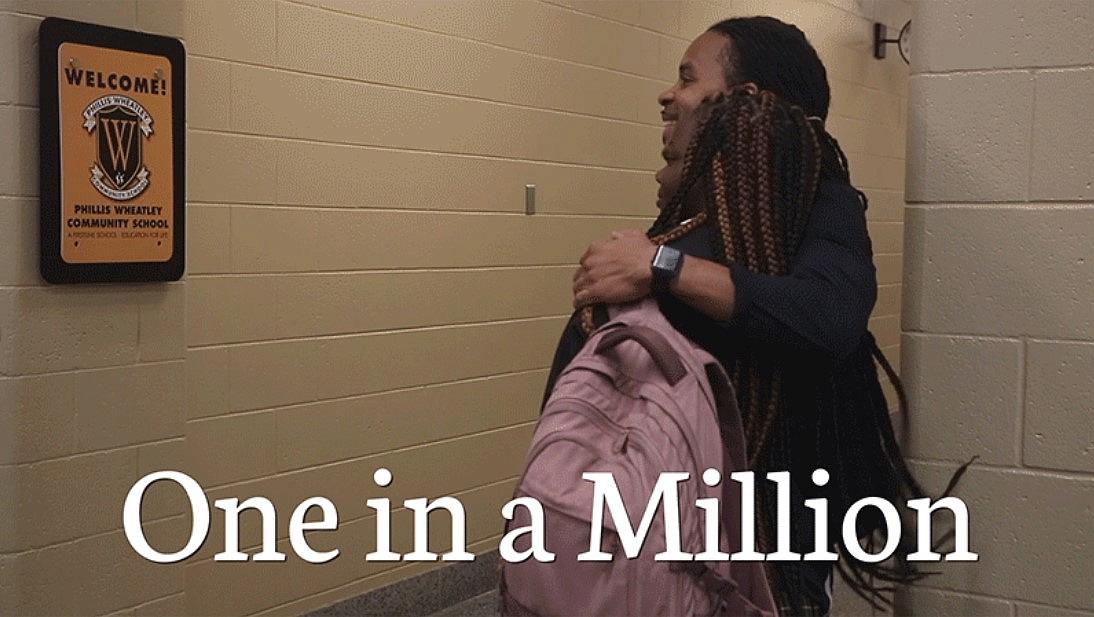
One in a million: Those are the odds of a drug dealer avoiding prison or death.
This is what Brennan Jacques tells his 7th and 8th grade students at Phillis Wheatley Community Schoolin Treme. He says this to shake them, to make them hear the truth before they get in too deep. If you deal drugs, you don’t get rich and retire, he says. You go to jail, or you go to the morgue.
Or you become a math teacher.
Nearly eight years ago, Jacques, now 30, was sentenced to federal prison for possession of cocaine with intent to distribute. That’s where his story should have ended, he says.
Jacques saw the scenario play out countless times while growing up in New Orleans’ St. Thomas projects. Young men just like him, traumatized by poverty and violence, and invariably sucked into a world of drugs and guns, spent the majority of their lives cycling in and out of prison. Or they were shot to death, he says.
Brennan Jacques greets students before classes at Phillis Wheatley Community School in Treme.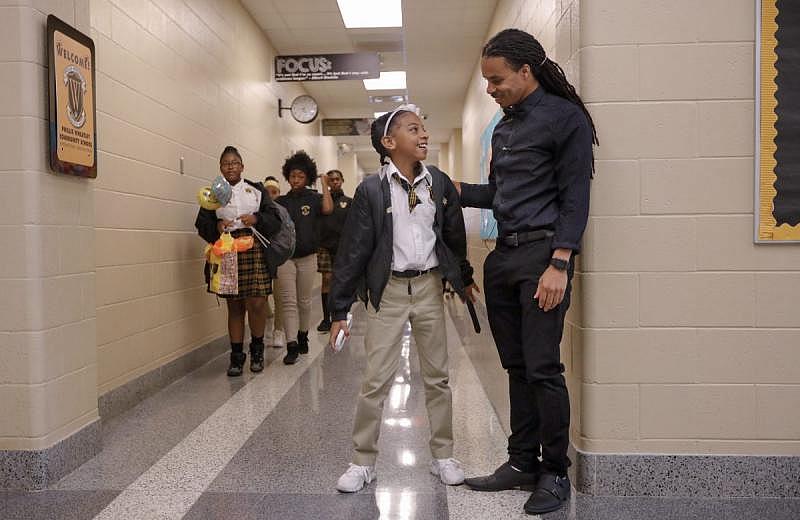
Jacques, the youngest of six siblings, experienced this phenomenon within his own family. He lost two brothers and a nephew to gun violence. His two other brothers were sentenced to more than 10 years each for violent crimes.
Even the one place where Jacques sought refuge as a child – organized sports – was not immune. Twenty-eight boys who at one time played for the Panthers youth football team, which had children from St. Thomas and Central City, were killed over a 14-year span, including seven players on Jacques’ 1999 team. Dozens more former players turned to selling drugs and were later arrested and sent to prison.
Jacques found himself among them – incarcerated at a young age, seemingly with no future. But that’s where his life took an unexpected turn. Three years after his release from prison, Jacques started his new career as an assistant math teacher and basketball coach at Phillis Wheatley, working primarily with children traumatized by violence, and those at risk of falling prey to the same temptations that temporarily derailed his own life.
Jacques knows he’s been given a rare second chance. It’s an opportunity he treasures and does not intend to waste. And he hopes that in telling his story, he can serve as both a cautionary tale for his students, and a source of inspiration.
“Just going through the things I went through in life, I feel like my job on earth is to give back,” he says. “I’m finding out that this must be my purpose.”
Jacques begins each school day the same way. He positions himself in the main lobby at 8:30 a.m. and waits for the school buses to pull up. Minutes later, the clanging of metal doors signals the arrival of the students.
“Here they come,” a teacher announces.
Scattered groups of children file inside — from pre-kindergarteners to 8th graders — filling the previously quiet hallways with a rumbling chorus of shouting, laughter and adolescent chatter.
“Good morning. Good morning y’all,” Jacques says, greeting them as they walk by. Many students stop to embrace the first-year teacher. The boys slap or shake Jacques’ hand, while the girls hug him, quietly resting their heads on his shoulder before moving on. Jacques smiles with each interaction, as if it’s happening for the first time.
Their bond is apparent. Jacques says it’s because the majority are growing up poor as he did, many coming from the nearby Lafitte housing development. He understands them and knows the things they may have seen. He saw them, too, as a child growing up in the projects: the shootings and beatings, the bloodletting in the courtyards and alleyways.
He knows the toll witnessing such trauma can exact, mentally, emotionally and physically. It puts you in a perpetual state of fear, Jacques says, something scientific studies have confirmed. And it chips away at your spirit, day by day.
A 2016 survey of 26 Phillis Wheatley students by the Institute of Women and Ethnic Studies found that 16 witnessed a shooting, stabbing or beating; 15 experienced the murder of someone close to them; and 10 have seen a murder. Half of these students screened positive at one point in their lives for post-traumatic stress disorder.
Phillis Wheatley has a range of initiatives designed to help children better process traumatic events: Daughters of Charity offers mental health counseling while Safe Schools NOLA trains educators to better identify the signs of trauma. But few things are as important as finding a teacher like Jacques who is personally attuned to the experiences of traumatized children. This is why the school upgraded his position to full-time after initially hiring him on a part-time basis, says School Director Diana Archuleta.
“We noticed immediately Brennan’s strength in building rapport with students, especially our middle school students who need the most social and emotional support,” Archuleta says. “These students feel understood by Brennan. They are motivated to grow.”
Brennan Jacques watches his team of 7th and 8th grade boys practice at Phillis Wheatley Community School in Treme. He recently coached the team to its first playoff win.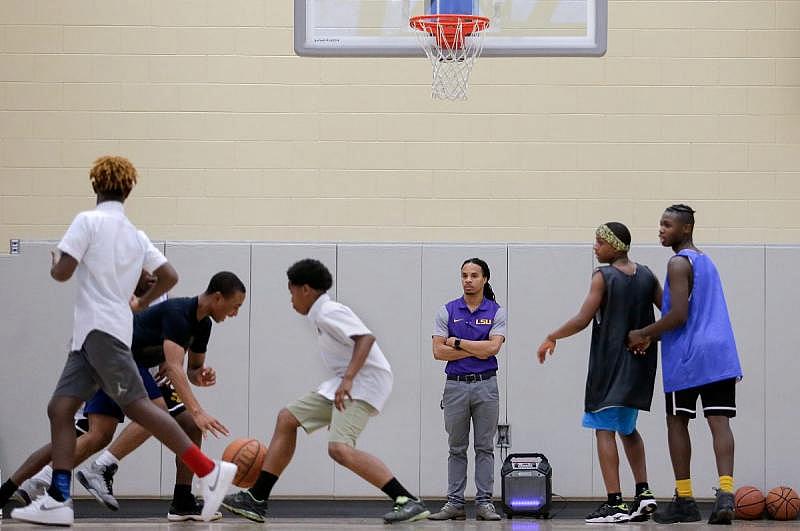
Hiring people who have themselves been exposed to violence is vital in efforts to promote the healing process among traumatized students, says John Fairbank, co-director of the National Child Traumatic Stress Network. Congress created the organization in 2000 to raise the standard of care and improve access to services for children exposed to violence.
People without such personal experiences might mistake the symptoms of trauma – which can include depression, anxiety, and paranoia – for bad behavior that needs to be punished instead of understood.
“It’s an incredibly important perspective,” Fairbank says.
It doesn’t, however, always ensure success. Jacques says he recently worked with a 14-year-old student who was wounded by gunfire while he watched as his best friend was shot to death last year. Now, the child exhibits all the signs of trauma, Jacques says. He is angry and reckless, lashing out at everyone around him.
Jacques talked to the teenager every day, desperately trying to steer him in the right direction. But he refused to listen. One day, the student said he wanted to drop out and sell drugs. A few weeks later, he stopped coming to school and never returned.
“His mind is already made up. He wants the street life,” Jacques says. “I try to tell him this is not where you want to be. I’ve been down that road before. I know the outcome.”
Jacques was raised by a single mother, along with four brothers and a sister, in the St. Thomas projects formerly located on the edge of the Lower Garden District. It was a close-knit community, he says, but it was rotting from the inside, devastated by neglect, poverty and crime.
Jacques was just seven years old when his oldest brother was shot to death over a dice game. Four years later, at 11, he witnessed his first murder. Jacques was playing football with some friends in a courtyard when two men ran into the court, one chasing the other.
“He’s just running away from him, but, I guess he got tired of running, turned around and shot him in the neck and you see the blood gushing out,” Jacques recalls.
That night, Jacques says he went home, laid down in the bathtub and replayed the shooting over and over in his mind.
“It was like me realizing, what if that was me?” he says. “I used to try to talk to my friends about it, but we’d laugh. To laugh about the situation was easier. We didn’t know how to interpret that or the right way to deal with it.”
It was around this time that Jacques was first introduced to drugs. He and his friends would be playing outside, he says, when suddenly one of the local dealers would come running through the courtyards, frantically tossing bundles of narcotics out of his pockets as the cops gave chase.
The ground would be littered with small plastic baggies filled with marijuana, crack cocaine or heroin, Jacques says. He and his friends would pick them up and inspect them. They didn’t know what they were. They didn’t know anything about drugs. They were just kids.
But they learned quickly.
Jacques’ mother didn’t like it when her sons played football in the driveways or courtyards of the St. Thomas, because “every time I came outside, it’s either somebody getting killed, somebody getting shot,” he says. So, Jacques and his older brothers, Nyron and Rivers, signed up to play for the Panthers in the city’s youth football league.
The team’s coach, Jerome Temple, known to most as DJ Jubilee, an innovator of New Orleans bounce music, remembers Jacques as one of his best defensive players, a small, scrappy kid whose heart made up for his lack of size.
“Brennan was special. You couldn’t take nothing away from him because he was going to prove to you he could play,” Temple says. “He was the shortest cornerback we ever had, but he ain’t afraid to tackle.”
Jacques is more definitive in assessing his career with the Panthers.
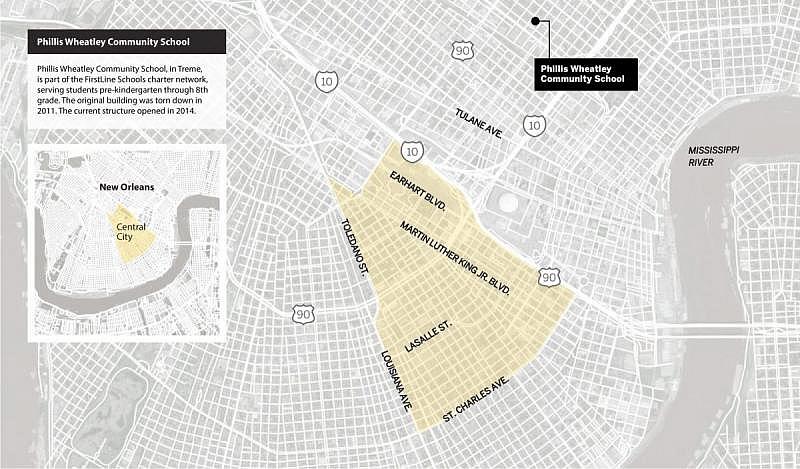
“I’ll probably go down as one of the best players who played for Jubilee,” he says, smiling.
Being on the Panthers gave the players the feeling that they were part of something positive, Jacques says. It allowed them to feel like they were valued, that they could rise above their circumstances if given the opportunity. These were the lessons Temple drilled into their young minds every day.
“Jube was someone we all looked up to. He’s a very inspiring individual who helped us to try to change. But as we grew older, we found our own niche and went our separate ways,” Jacques says. “If we would have kept being under his wing, I’m pretty sure we would have all made it.”
After the Jacques brothers aged out of youth football and moved on to high school, Temple says he began to hear rumblings they were getting into “the game,” hustling and selling drugs. Brennan’s involvement came as a surprise.
“We didn’t think Brennan would do all that type of stuff. He was low-key, wasn’t wilding out on the corners,” Temple says. “But they was in the projects. They lived there. And once they got hooked on that lifestyle, the money, that became them. And after a while, that’s when trouble came.”
Jacques started selling drugs at an early age, before he became a teenager. Most people he knew were involved in some form of criminal activity, including his brothers, so it seemed like a natural thing to do, he says. But he never took any of it seriously, not until his daughter was born while he was still a student at O. Perry Walker High School.
Jacques says he needed to take care of his newly formed family and a normal job wasn’t cutting it financially. At first, he sold drugs just to get by, but soon the money became too hard to resist and drug dealing became a full-time profession.
Brennan Jacques watches his team of 7th and 8th grade boys practice at Phillis Wheatley Community School in Treme. He recently coached the team to its first playoff win.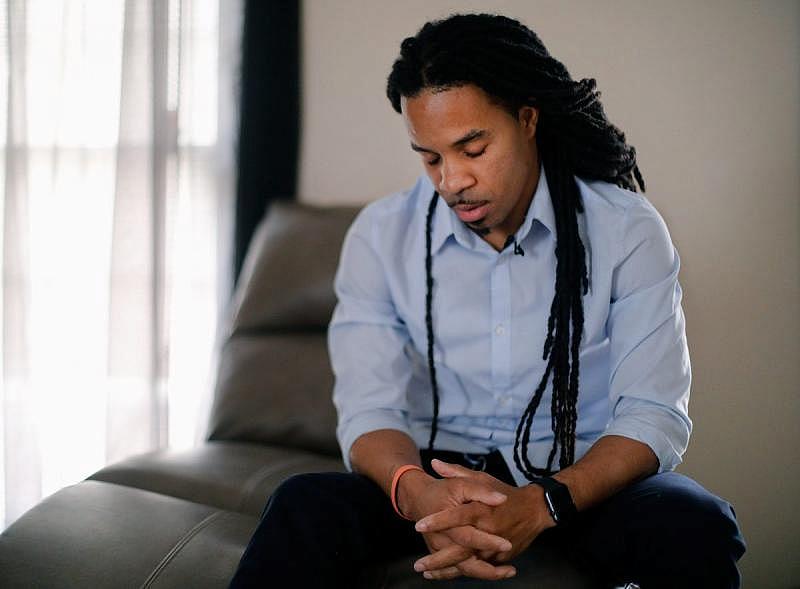
“In a week I could make easily $50,000. As long as the money was coming, I wasn’t going to turn it down.”
Everything changed in 2009, when Jacques experienced what he describes as three life-altering events. The first happened in June when his brother, Rivers, was arrested in connection with the shooting of a man outside of Harrah’s Casino. He was sentenced to 12 years for aggravated battery as a multiple offender.
“That’s when I realized that I need to fall back. I need to get out of this life,” Jacques says, before pausing to collect his thoughts. “I didn’t get out in time.”
The second occurred a month later. Jacques was lying on the couch in his Gretna apartment when federal agents kicked in the door. They seized 1.6 pounds of crack cocaine and about $30,000 in cash, according to court records. It was his first arrest. Jacques got five years at the Federal Correctional Complex in Beaumont, Texas.
Three months after Jacques’s arrest, his 19-year-old nephew, Bilal Jacques, was shot to death in Harvey. Jacques was sitting in a jail cell when he heard the news. “I just shut down,” he says.
That was the third.
Jacques couldn’t beat the odds. He did not become that one-in-a-million drug dealer who was able to retire young and wealthy. Like the vast majority that came before him, he found himself broke, in prison at the age of 22, wondering how everything went so wrong. He was lost.
One day, Jacques says he showed a fellow inmate a picture of his daughter, who was 5 at the time. The man, who was serving a life sentence, looked at the picture, handed it back to Jacques, and said, “I’m never going home to see my kids. I’ll never see them again. Is this the life you want? You’re young and still have another opportunity out there. So, what you going to do?’”
That’s when things finally became clear, Jacques says.
“At the time I didn’t know nothing but drugs. That’s all I knew. But I said, ‘I can’t do this no more. I have a daughter. I want to be in my child’s life.’ So, I made a decision. I’m a come home and do something,” he says. “I still did not have a clue what I wanted to do, but I made my mind up and said, ‘I don’t want to sell drugs.’”
Before Jacques was released, he called a friend, Sean Reynolds, who manages Semolina’s restaurant. He told him he was getting out of prison in a few days and needed a job. Reynolds didn’t hesitate, despite Jacques’ drug conviction.
“The last time I saw him I said, ‘You’ll always have a home with me,’” says Reynolds, who has worked with Jacques at various restaurants on and off for 15 years. “Knowing him so long, I knew the type of person he was, and I knew he just messed up.”
After securing a job at Semolina’s — where he continues to work nights following each school day — Jacques decided to enroll at Southern University at New Orleans, majoring in mathematics. He went on to graduate cum laude.
“I was never dumb, I just made dumb decisions,” he says.
A few months later, Jacques took a chance and applied for a teaching position at Phillis Wheatley, never imagining he would be hired. He started his first day of school Aug. 1, 2017.
Dr. Joe Omojola, a professor at SUNO and Jacques mentor and academic advisor there, remembers his former student as a leader among his peers, someone with a “magnetic personality” who saw college as a second chance and grabbed hold of it.
“I think he made up his mind, ‘I’m going to do everything I need to do.’ And he did everything he needed to do. He took academics very seriously. It took a lot of responsibility. I’m very proud of him. He’s going to be a good role model for these kids,” Omojola says.
The person who was proudest of Jacques was his mother. She had endured years of heartbreak. At one point in 2009, all four of her surviving sons were in prison. She did her best to keep them out of trouble, Jacques says, to shield them from crime within the St. Thomas, but there was only so much a single, working mother could do with four headstrong boys. So, to see one of them finally do right, it meant the world to her.
“She was ecstatic. She threw me a birthday party slash graduation party. I never had a birthday party before,” he says.
What should have been a moment of celebration, though, was bittersweet. Five months earlier, Jacques’ older brother, Nyron, was shot to death on Orleans Avenue. Jacques says he received a text from his brother that day asking if he wanted to play basketball, but he never responded because he was at work. A few hours later, Nyron was dead.
“It’s crazy,” Jacques says, his voice growing soft as he fights back tears. “I tried to tell him, ‘Man, (you) need to chill out, (you) need to change things up.’ But he didn’t want to listen to me.”
Jacques’ old coach, Jerome Temple, pulls out a piece of paper while sitting in his office at A.L. Davis Park. It’s a list of former players he has coached who were later killed over a 14-year span. The 28 names include Jacques’ brother, Nyron, and his nephew, Bilal.
These weren’t bad kids, Temple says. But there was only so much he could do. By the time they came to him as players, when they were 13 or 14 years old, many had already seen people murdered, experienced domestic violence, and watched people sell and use drugs around them while they tried to play football in the courtyards of the projects.
For many, the exposure to so much trauma ultimately became too much to overcome, Temple says. But there were some players, like Jacques, who found a way to rise above it. Those are the ones who will lead the way for the next generation, he says.
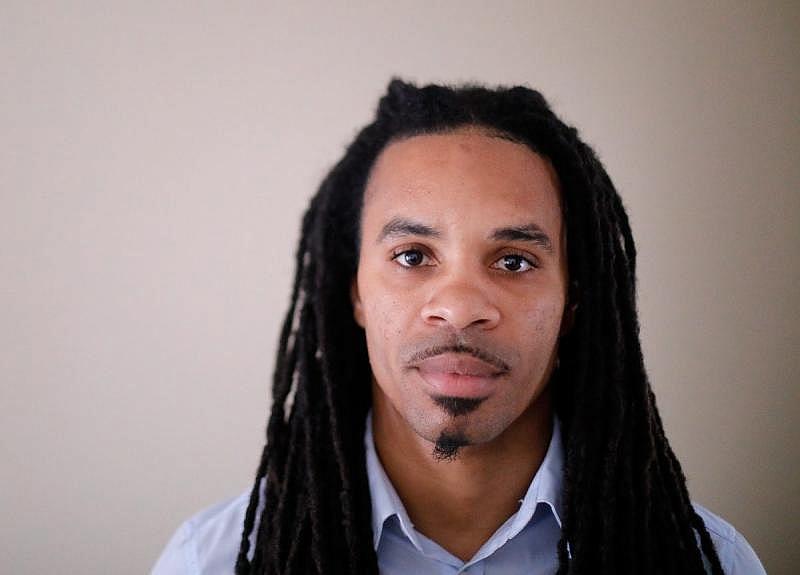
“Young kid grew up in the St. Thomas. Never was a bad kid. Got in trouble, sold drugs, served his time, got out, went to college, graduated cum laude, now he’s a school teacher. Bam! There it is. That’s one of those stories that need to be told,” Temple says. “The city should look at that and honor this kid who comes from the streets, made a mistake, and gave back.”
On a recent Saturday, Jacques coached the Phillis Wheatley basketball team of 7th and 8th grade boys to their first playoff win in the New Orleans Charter School Athletic Association league. The game took place at College Cohen Prep, less than a mile from A.L. Davis Park where Jacques played football with the Panthers.
While the coach of the opposing team stalked the sideline, screaming at his players when they made a mistake, Jacques remained calm, encouraging his boys to do better when they messed up, to concentrate and focus, to play together, as a team.
“It’s a thin line between wins and losses,” Jacques says, commenting on both the game and his life. “Even when you win, you still lose because you went about it the wrong way.”
What does he want his students to take away from his story? Hope, Jacques says, that the violence they have seen does not define them. Jacques stands before them as proof that trauma does not have to be a life sentence.
“This is my life right here,” he says as his players celebrate in the middle of the court following the end of the game. “For me to be able to come in and give them a little extra energy, to pump them up and let them know they can do anything they want to do … this is where I need to be.”
[This story was originally published by NOLA.com | The Times-Picayune.]


